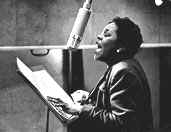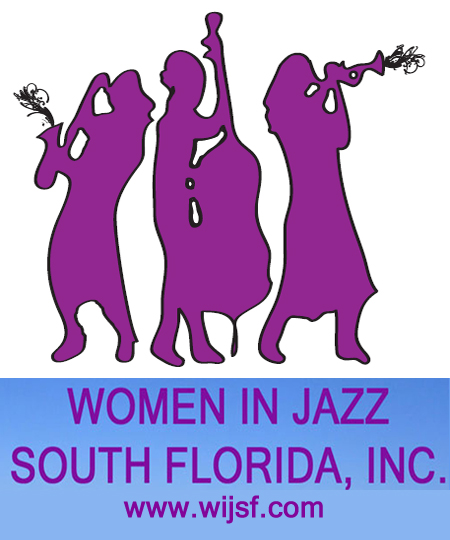Dinah Washington

Dinah Washington was born Ruth Jones in Tuscaloosa, Alabama, on August 29, 1924. Washington moved to Chicago’s South Side when she was three or four. Her mother played piano at St. Luke’s Baptist Church, passing along her keyboard prowess to her young offspring.
Washington played piano and directed her church choir growing up in Chicago. For a while she did split her time between clubs and singing and playing piano in Salle Martin 's gospel choir as Ruth Jones.
Spirituals comprised much of her initial focus; she hooked up with gospel pioneer Sallie Martin in 1940, hitting the road for a time as her accompanist. Yet secular pursuits had long intrigued her. Before joining Martin, the young singer had won first prize at a Regal Theater amateur contest. One of the most versatile and gifted vocalists in American popular music history, Dinah Washington made extraordinary recordings in jazz, blues, R&B and light pop contexts, and could have done the same in gospel had she chosen to record in that mode. But the former Ruth Jones didn't believe in mixing the secular and spiritual, and once she'd entered the non-religious music world professionally, refused to include gospel in her repertoire.
Washington 's penetrating, high-pitched voice, incredible sense of drama and timing, crystal clear enunciation and equal facility with sad, bawdy, celebratory or rousing material enabled her to sing any and everything with distinction.
There's some dispute about the origin of her name. Some sources say the manager of the Garrick Stage Bar gave her the name Dinah Washington; other say it was Hampton who selected it. It is undisputed Hampton heard and was impressed by Washington , who'd been discovered by manager Joe Glaser. She worked in Hampton 's band from 1943 to 1946.
Some of her biggest R&B hits were written by Leonard Feather , the distinguished critic who was a successful composer in the '40s. Washington dominated the R&B charts in the late '40s and '50s, but also did straight jazz sessions for EmArcy and Mercury, with horn accompanists including Clifford Brown , Clark Terry and Maynard Ferguson, and pianists Wynton Kelly , a young Joe Zawinul and Andrew Hill. She wanted to record what she liked, irregardless of whether it was considered suitable, and in today's market would be a crossover superstar.
From that point forward nearly all of her recordings were slow ballads with accompaniment from faceless orchestras that would not have been out of place on a country record! Although she did have a few more hits (including some duets with Brook Benton), Washington's post-1958 output has not dated well at all, unlike the music from her first 15 years of recordings. However she was only 39 and still in peak musical form when she died from an accidental overdose of diet pills and alcohol in 1963.
Whether it was bandleader Lionel Hampton, booking agent Joe Glaser, or Garrick Stage Bar boss Joe Sherman who gave Ruth the memorable stage handle of Dinah Washington, there’s no disputing her steady rise to stardom. A featured billing the Garrick led Hampton to hire her to sing with his big band in 1943. Photo © Herman Leonard Photography
Jazz critic Leonard Feather caught her with the Hampton band that December at Harlem’s Apollo and convinced Keynote Records to sponsor her debut session, but recording opportunities proved scarce while she was in Hampton’s employ. Before year’s end, Washington bid Hampton adieu, recording three Los Angeles sessions for the Apollo label under her own name before signing with the then-fledgling Mercury. She cut her first date for Mercury in January 1946, and by the summer of ’48 her solo star was in rapid ascension.
At the same time, Washington was interacting with some serious jazz royalty. She recorded with trumpeters Clifford Brown and Clark Terry, drummer Max Roach, and saxophonists Lockjaw Davis and Cannonball Adderly in the mid-Fifties, utilized Quincy Jones’s budding talents as an arranger, and employed pianist Wynton Kelly, drummer Jimmy Cobb, and tenor saxophonist Eddie Chamblee in her combo for extended stretches. (Chamblee was also one of her many husbands.)
Finally, in 1959, Dinah Washington made the full-fledged leap to pop stardom, thanks to the lovely Belford Hendricks-arranged ballad "What a Difference a Day Makes". Under a&r man Clyde Otis’s market-savvy direction, she mined more pop gold with the stately "Unforgettable" and "This Bitter Earth". It was Otis’s brainstorm to pair Washington with her deep-voiced label mate Brook Benton; their seemingly playful duet "Baby, You Got What It Takes" masked serious tension between the two, but the end result was a giant pop and r&b hit in 1960.
An unintentional but lethal combination of alcohol and pills forever stilled Dinah Washington’s magnificent voice in Detroit on December 14, 1963. She was only thirty-nine.
Dinah Washington remains the biggest influence on most black female singers (particularly in R&B and soul) who have come to prominence since the mid-'50s. Virtually all of her recordings are currently in print on CD's including a massive reissue series of her Mercury and EmArcy sessions. -- Ron Wynn and Dan Morgenstern

-
Born RUTH JONES, in Tuscaloosa, Alabama
-
Moved to Chicago at age 4
-
Mother played piano at St. Luke’s Baptist Church
-
Played piano and directed church choir, in Chicago, and on the road with gospel pioneer Sallie Martin, in 940
-
Extraordinary recordings in jazz, blues, R&B and light pop
-
First prize at a Regal Theater amateur contest.
-
Cut first record for Mercury, January 1946, and a star by 1948
-
Worked with Lionel Hampton 's band from 1943 to 1946
-
Sang with Clifford Brown, Clark Terry, Maynard Ferguson, pianists Wynton Kelly, Joe Zawinul and Andrew Hill
-
Duets with Brook Benton on "Baby, You Got What It Takes" and "Rockin' Good Way”
-
Recorded critic Leonard Feather compositions
-
EmArcy and Mercury Records
-
Dominated the R&B charts in the late '40s and '50s
-
1991 Inductee - Lifework Award for Performing Achievement
-
Recorded slow ballads "What A Difference A Day Makes"
-
Also, worked with drummer Max Roach, and saxophonists Lockjaw Davis and Cannonball Adderly in the mid-Fifties, utilized Quincy Jones’s budding talents as an arranger, and employed pianist Wynton Kelly, drummer Jimmy Cobb, and tenor sax Eddie Chamblee, one of her eight husbands, in her combo for extended stretches.
-
In 1959, Dinah made the leap to pop stardom with "What a Diff’rence a Day Makes”, "Unforgettable", "This Bitter Earth”, “September in the Rain", "Where Are You"
-
Died of alcohol and pills at thirty-nine.
Bill Dahl (Excerpted from Dinah Washington’s Finest Hour)
Washington's biggest hit was "What a Diff'rence a Day Made" (1959).
Her other popular recordings include "Unforgettable" (1959), "This Bitter Earth" (1959), "September in the Rain" (1960), and "Where Are You" (1962).
She also made two hit recordings with singer Brooke Benton, "Baby (You've Got What It Takes") in 1959 and "Rockin' Good Way" in 1960.
1991 Inductee - Lifework Award for Performing Achievement


